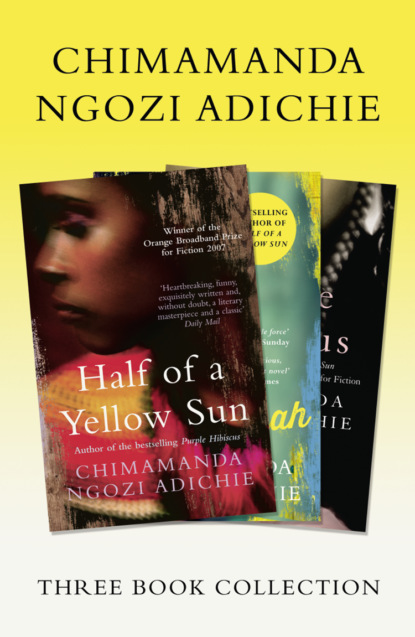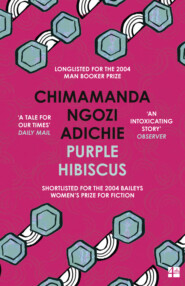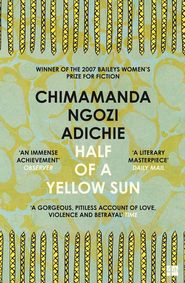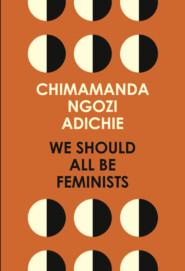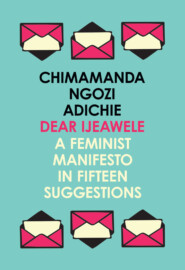По всем вопросам обращайтесь на: info@litportal.ru
(©) 2003-2024.
✖
Half of a Yellow Sun, Americanah, Purple Hibiscus: Chimamanda Ngozi Adichie Three-Book Collection
Автор
Год написания книги
2018
Настройки чтения
Размер шрифта
Высота строк
Поля
‘A houseboy in Nsukka. You’ll need somebody to wash your clothes and clean your house.’
He was momentarily confused by the non sequitur. ‘A houseboy? I can manage quite well. I’ve lived alone for too long.’
‘I’ll ask Olanna to find somebody,’ Kainene said. She pulled a cigarette from the case, but she didn’t light it. She put it down on the bedside table and came over and hugged him, a tremulous tightening of her arms around him. He was so surprised he did not hug her back. She had never embraced him that closely unless they were in bed. She did not seem to know what to make of the hug either, because she backed away from him quickly and lit the cigarette. He thought about that hug often, and each time he did he had the sensation of a wall crumbling.
Richard left for Nsukka a week later. He drove at moderate speed, pulling off the road once in a while to look at the hand-drawn map Kainene had given him. After he crossed the River Niger, he decided to stop at Igbo-Ukwu. Now that he was finally in Igbo land, he wanted to see the home of the roped pot before anything else. A few cement houses dotted the village; they marred the picturesque quality of the mud huts that were crowded on either side of dirt paths, paths so narrow he parked his car a long way away and followed a young man in khaki shorts who seemed used to showing visitors around. His name was Emeka Anozie. He had been one of the labourers who worked at the dig. He showed Richard the wide, rectangular ditches where the excavations had taken place, the shovels and pans that had been used to brush the dust off the bronzes.
‘You want to talk to our big father? I will interpret for you,’ Emeka offered.
‘Thank you.’ Richard felt slightly overwhelmed by the warm reception, by the neighbours who trailed in and said, ‘Good afternoon, nno, welcome,’ as if they did not even think about minding that he had come uninvited.
Pa Anozie had a dirty-looking cloth wound round his body and tied behind his neck. He led the way into his dim obi, which smelt of mushrooms. Although Richard had read about how the bronzes were found, he asked the question anyway. Pa Anozie nudged a pinch of snuff up his nostrils before he began telling the story. About twenty years ago, his brother was digging a well when he hit something metallic that turned out to be a gourd. He soon found a few others and brought them out, washed them, and called the neighbours to come in and see them. They looked well crafted and vaguely familiar, but nobody knew of anyone making anything like them. Soon, word got to the district commissioner in Enugu, who sent somebody to take them to the Department of Antiquities in Lagos. After that, nobody came or asked anything else about the bronzes for a while, and his brother built his well and life went on. Then, a few years ago, the white man from Ibadan came to excavate. There were long talks before the work began, because of a goat house and compound wall that would have to be removed, but the work went well. It was harmattan, but because they feared the thunderstorms, they covered the ditches with tarpaulins spread across bamboo sticks. They found such lovely things: calabashes, shells, many ornaments that women used to decorate themselves, snake images, pots.
‘They also found a burial chamber, didn’t they?’ Richard asked.
‘Yes.’
‘Do you think it was used by the king?’
Pa Anozie gave Richard a long, pained look and mumbled something for a while, looking grieved. Emeka laughed before he translated. ‘Papa said he thought you were among the white people who know something. He said the people of Igboland do not know what a king is. We have priests and elders. The burial place was maybe for a priest. But the priest does not suffer people like king. It is because the white man gave us warrant chiefs that foolish men are calling themselves kings today.’
Richard apologized. He did know that the Igbo were said to have been a republican tribe for thousands of years, but one of the articles about the Igbo-Ukwu findings had suggested that perhaps they once had kings and later deposed them. The Igbo were, after all, a people who deposed gods that had outlived their usefulness. Richard sat there for a while, imagining the lives of people who were capable of such beauty, such complexity, in the time of Alfred the Great. He wanted to write about this, to create something from this, but he did not know what. Perhaps a speculative novel where the main character is an archaeologist digging for bronzes who is then transported to an idyllic past?
He thanked Pa Anozie and got up to leave. Pa Anozie said something and Emeka asked, ‘Papa is asking will you not take photo of him? All the white people that have come take photo.’
Richard shook his head. ‘No, sorry. I haven’t brought a camera.’
Emeka laughed. ‘Papa is asking what kind of white man is this? Why did he come here and what is he doing?’
As he drove towards Nsukka, Richard, too, wondered just what he was doing and, more worrying, what he was going to write.
The university house on Imoke Street was reserved for visiting researchers and artists; it was sparse, near ascetic, and Richard looked over the two armchairs in the living room, the single bed, the bare kitchen cupboards, and felt instantly at home. The house was filled with a suitable silence. When he visited Olanna and Odenigbo, though, she said, ‘I’m sure you must want to make the place a little more habitable,’ so he said, ‘Yes,’ although he liked the soulless furnishing. He agreed only because Olanna’s smile was like a prize, because her attention flattered him. She insisted that he hire their gardener, Jomo, to come in twice a week and plant some flowers in the yard. She introduced him to their friends; she showed him the market; she said she had found him the perfect houseboy.
Richard envisaged somebody young and alert like their houseboy, Ugwu, but Harrison turned out to be a small, stooped stick of a man, middle-aged, wearing an oversized white shirt that stopped below his knees. He bowed extravagantly at the beginning of each conversation. He told Richard with unconcealed pride that he had formerly worked for the Irish priest Father Bernard and the American professor Land. ‘I am making very good beet salad,’ he said that first day, and later Richard realized that he was proud not only of his salad but also of cooking with beets, which he had to buy in the ‘specialty vegetable’ stall because most Nigerians did not eat them. The first dinner Harrison cooked was a savoury fish, with the beet salad as a starter. A crimson beet stew appeared next to his rice the following evening. ‘It is from an American recipe for potato stew that I am making this one,’ Harrison said, as he watched Richard eat. The next day, there was a beet salad, and the next another beet stew, now frighteningly red, next to the chicken.
‘No more, please, Harrison,’ Richard said, raising his hand. ‘No more beets.’
Harrison looked disappointed, and then his face brightened. ‘But, sah, I am cooking the food of your country; all the food you are eating as children I cook. In fact, I’m not cooking Nigerian foods, only foreign recipe.’
‘Nigerian food is quite all right, Harrison,’ Richard said. If only Harrison knew how much he had disliked the food of his childhood, the sharp-tasting kippers full of bones, the porridge with the appalling thick skin on top like a waterproof lining, the overcooked roast beef with fat around the edges drenched in gravy.
‘Okay, sah.’ Harrison looked morose.
‘By the way, Harrison, do you happen to know of any herbs for men?’ Richard asked, hoping he sounded casual.
‘Sah?’
‘Herbs.’ Richard gestured vaguely.
‘Vegetables, sah? Oh, I make any of the salad of your country very good, sah. For Professor Land, I am making many different-different salad.’
‘Yes, but I mean vegetables for sickness.’
‘Sickness? You see doctor in Medical Centre.’
‘I am interested in African herbs, Harrison.’
‘But sah, they are bad, from the witch doctor. They are devilish.’
‘Of course.’ Richard gave up. He should have known that Harrison, with his excessive love for all things non-Nigerian, was not the right person to ask. He would ask Jomo instead.
Richard waited until Jomo arrived and then stood at the window watching him water the newly planted lilies. Jomo placed the watering can aside and began to pick the umbrella tree fruit; they had fallen during the previous night and lay, oval and pale yellow, on the lawn. Richard often smelt the over-sweetness of their rotting, a scent he knew he would always associate with living in Nsukka. Jomo held a raffia bag full of fruit when Richard came up to him.
‘Oh. Good morning, Mr Richard, sah,’ he said, in his solemn manner. ‘I want take the fruit to Harrison in case you want, sah. I no take them for myself.’ Jomo placed the bag down and picked up his watering can.
‘It’s all right, Jomo. I don’t want any of the fruit,’ Richard said. ‘By the way, would you know of any herbs for men? For men who have problems with … with being with a woman?’
‘Yes, sah.’ Jomo kept watering as if this was a question he heard every day.
‘You know of some herbs for men?’
‘Yes, sah.’
Richard felt a triumphant leap in his stomach. ‘I should like to see them, Jomo.’
‘My brother get problem before because the first wife is not pregnant and the second wife is not pregnant. There is one leaf that the dibia give him and he begin to chew. Now he has pregnant the wives.’
‘Oh. Very good. Could you get me this herb, Jomo?’
Jomo stopped and looked at him, his wise, wizened face full of fond pity. ‘It no work for white man, sah.’
‘Oh, no. I want to write about it.’
Jomo shook his head. ‘You go to dibia and you chew it there in front of him. Not for writing, sah.’ Jomo turned back to his watering, humming tunelessly.
‘I see,’ Richard said, and as he went back indoors he made sure not to let his dejection show; he walked straight and reminded himself that he was, after all, the master.
Harrison was standing outside the front door, pretending to polish the glass. ‘Is there something that Jomo is not doing well, sah?’ he asked hopefully.
‘I was just asking Jomo some questions.’
Harrison looked disappointed. It was clear from the beginning that he and Jomo would not get along, the cook and the gardener, each thinking himself better than the other. Once, Richard heard Harrison tell Jomo not to water the plants outside the study window because ‘the sound of water is disturbing Sah writing.’ Harrison wanted Richard to hear it, too, the way he spoke loudly, standing just outside the study window. Harrison’s obsequiousness amused Richard, as did Harrison’s reverence for his writing; Harrison had taken to dusting the typewriter every day, even though it was never dusty, and was reluctant to throw away manuscript pages he saw in the dustbin. ‘You are not using this again, sah? You are sure?’ Harrison would ask, holding the crumpled pages, and Richard would say that, yes, he was sure. Sometimes he wondered what Harrison would say if he told him that he wasn’t even sure what he was writing about, that he had written a sketch about an archaeologist and then discarded it, written a love story between an Englishman and an African woman and discarded it, and had started writing about life in a small Nigerian town. Most of his material for his latest effort came from the evenings he spent with Odenigbo and Olanna and their friends. They were casually accepting of him, did not pay him any particular attention, and perhaps because of that, he felt comfortable sitting on a sofa in the living room and listening.
When Olanna first introduced him to Odenigbo, saying, ‘This is Kainene’s friend that I told you about, Richard Churchill,’ Odenigbo shook his hand warmly and said, “‘I have not become the king’s first minister in order to preside over the liquidation of the British Empire.”’
It took Richard a moment to understand before he laughed at the poor imitation of Sir Winston Churchill. Later, he watched Odenigbo wave around a copy of the Daily Times, shouting, ‘It is now that we have to begin to decolonize our education! Not tomorrow, now! Teach them our history!’ and thought to himself that here was a man who trusted the eccentricity that was his personality, a man who was not particularly attractive but who would draw the most attention in a room full of attractive men. Richard watched Olanna as well, and each time he glanced at her he felt renewed, as if she had become more beautiful in the preceding minutes. He felt an unpleasant emotion, though, seeing Odenigbo’s hand placed on her shoulder and, later, imagining them together in bed. He and Olanna said little to each other, outside of the general conversation, but a day before he left to visit Kainene in Port Harcourt, Olanna said, ‘Richard, please greet Kainene.’
‘I will,’ he said; it was the first time she had mentioned Kainene.





